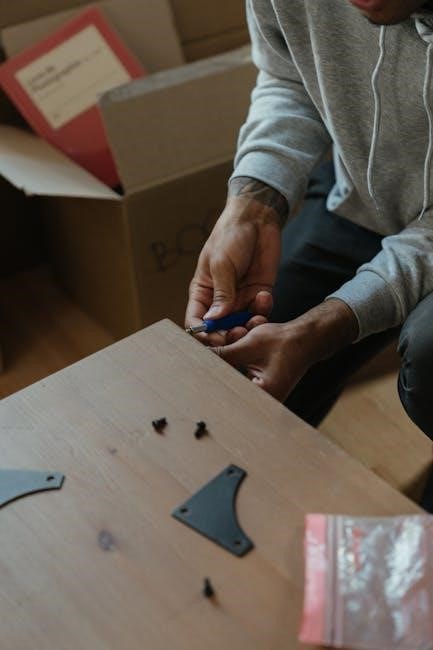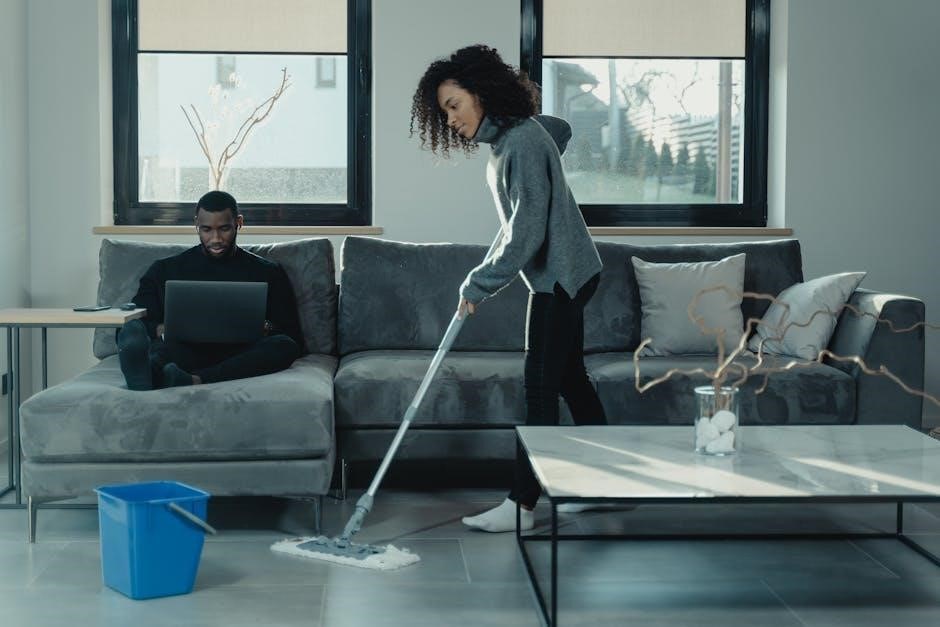Hibiclens is a medical-grade antimicrobial soap containing chlorhexidine gluconate, commonly used for pre-surgery skin preparation and wound care to prevent infections, trusted in hospitals for its long-lasting germ-killing properties․
What is Hibiclens?
Hibiclens is an antimicrobial skin cleanser containing chlorhexidine gluconate, a broad-spectrum antiseptic effective against bacteria, viruses, and fungi․ It is widely used in healthcare settings for pre-surgery preparation, wound care, and general hygiene due to its ability to reduce microbial flora on the skin․ The active ingredient, chlorhexidine, binds to the skin, providing long-lasting protection even after rinsing․ Available over-the-counter, Hibiclens comes in liquid form or as a scrub brush applicator, making it versatile for different uses․ Its medical-grade formula ensures deep cleansing and antimicrobial action, making it a trusted choice for both medical professionals and patients․ It is safe for repeated use and does not require a prescription, though it is recommended to follow specific instructions for optimal results․
Key Benefits of Using Hibiclens
Hibiclens offers numerous benefits as an antimicrobial cleanser, making it a preferred choice for various medical and personal care needs․ Its active ingredient, chlorhexidine gluconate, provides long-lasting protection against bacteria, viruses, and fungi, reducing the risk of infection․ It is particularly effective for pre-surgery skin preparation, wound care, and general hygiene․ Hibiclens is easy to use, gentle on the skin, and suitable for repeated applications․ Unlike regular soaps, it continues to work after rinsing, offering residual antimicrobial activity for up to 24 hours․ This makes it ideal for surgical patients, individuals with open wounds, and healthcare professionals․ Its medical-grade formulation ensures deep cleansing without causing irritation, making it a reliable solution for maintaining skin health and preventing infections․

When to Use Hibiclens
Hibiclens is ideal for pre-surgery preparation, wound care, and general antimicrobial cleansing․ Use it before surgery to reduce infection risk, for wound cleaning to promote healing, and for everyday germ-killing protection․

Pre-Surgery Preparation
Hibiclens is commonly used for pre-surgery skin preparation to reduce the risk of infection․ Patients are typically instructed to shower with Hibiclens the night before and the morning of surgery․ Apply the solution directly to the skin, avoiding sensitive areas like the eyes, ears, and mouth․ Gently wash the entire body, focusing on the surgical site, and rinse thoroughly with warm water․ Do not use regular soap after applying Hibiclens, as it may reduce its effectiveness․ This routine helps ensure the skin is clean and germ-free, lowering the chance of surgical site infections; Hibiclens is trusted in hospitals for its long-lasting antimicrobial properties, making it a critical step in pre-operative care․
Wound Care and Infection Prevention
Hibiclens is widely used for wound care and infection prevention due to its strong antimicrobial properties․ It effectively kills bacteria, viruses, and fungi, making it ideal for cleansing and disinfecting wounds․ When applied to affected areas, Hibiclens helps reduce the risk of infection and promotes healing․ For minor wounds or scrapes, it can be used to clean the area gently․ However, it should not be applied to deep wounds or sensitive tissues without medical advice․ Hibiclens is also recommended for patients with compromised immune systems to prevent infections․ Its residual activity continues to protect the skin long after rinsing, making it a reliable choice for wound care and infection prevention in both clinical and home settings․
General Hygiene and Antimicrobial Cleansing
Hibiclens is a versatile antimicrobial cleanser effective for general hygiene and daily use․ It provides broad-spectrum protection against bacteria, viruses, and fungi, making it ideal for skin cleansing in various settings․ Unlike regular soaps, Hibiclens leaves a residual layer on the skin, offering prolonged antimicrobial activity even after rinsing․ This makes it a popular choice for individuals seeking enhanced hygiene, especially in environments where infection control is critical․ For general use, Hibiclens can be applied directly to the skin, lathered gently, and rinsed thoroughly with warm water․ It is also suitable for cleansing areas prone to odor, providing a fresh and clean feel․ Regular use of Hibiclens supports overall skin health and helps maintain a high standard of personal hygiene․

Step-by-Step Instructions for Using Hibiclens
Apply Hibiclens with a clean washcloth, gently massaging onto skin․ Rinse thoroughly after 1-2 minutes․ Avoid sensitive areas and do not use regular soap afterward․
Shower or Bathe the Night Before Surgery
Hibiclens bottle, pour some into your hand or a clean washcloth, and gently apply it to your skin from the neck down․ Avoid sensitive areas and open wounds․ Allow the solution to stay on your skin for 1-2 minutes before rinsing thoroughly with warm water․ Do not use regular soap after applying Hibiclens․ Pat dry with a clean, freshly laundered towel and wear clean clothes․ This step helps reduce the risk of infection and prepares your skin for surgery․
Shower or Bathe the Morning of Surgery
On the morning of your surgery, repeat the cleansing process with Hibiclens to ensure optimal antimicrobial protection․ Start by washing your hair with your usual shampoo and conditioner, rinsing thoroughly․ Then, wash your face and genital area with your regular soap․ Open the Hibiclens bottle, pour some into your hand or a clean washcloth, and gently apply it to your skin from the neck down․ Avoid sensitive areas, such as the eyes, ears, mouth, and genital area, as well as any open wounds or scrapes․ Allow the solution to stay on your skin for 1-2 minutes before rinsing thoroughly with warm water․ Do not use regular soap after applying Hibiclens․ Pat dry with a clean, freshly laundered towel and wear clean clothes to minimize the risk of infection․
Apply the Minimum Amount Necessary
When using Hibiclens, apply only a small amount necessary to cover the skin area you are cleansing․ This ensures effective antimicrobial action without wasting product․ Pour the solution directly onto your hand or a clean washcloth, then gently apply it to the skin․ Avoid applying Hibiclens to sensitive areas such as the eyes, ears, mouth, or genital regions․ Do not dilute the solution with water, as this may reduce its effectiveness․ After applying, allow the solution to stay on the skin for 1-2 minutes before rinsing thoroughly with warm water․ Use a clean, damp washcloth to gently scrub the skin, focusing on areas prone to germs․ Rinse completely to remove all residue, ensuring no soap remains on the skin․ Avoid using regular soap after Hibiclens, as it may interfere with its antimicrobial properties․
Wash Gently and Avoid Sensitive Areas
When washing with Hibiclens, use gentle, massaging strokes to clean the skin without causing irritation; Avoid applying the solution to sensitive areas such as the eyes, ears, mouth, or genital regions, as it may cause discomfort or irritation․ If accidentally exposed, rinse thoroughly with warm water․ Do not scrub harshly, as this can damage the skin and reduce the product’s effectiveness․ Focus on cleansing areas prone to germs, such as the neck, arms, and legs, while being mindful of delicate skin․ After washing, rinse thoroughly to ensure no residue remains․ This gentle approach helps maintain the skin’s natural barrier while leveraging Hibiclens’s antimicrobial properties to prevent infections and promote healing․

Rinse Thoroughly with Warm Water
After applying Hibiclens, rinse your skin thoroughly with warm water to remove all residue․ Ensure that all areas where the product was applied are rinsed well, as leftover soap can cause irritation or dryness․ Use warm, not hot, water to avoid stripping the skin of its natural oils․ Pay particular attention to areas where Hibiclens was applied, such as the neck, arms, and legs․ Rinsing thoroughly helps maintain the product’s effectiveness and prevents any potential discomfort․ Once rinsed, gently pat your skin dry with a clean towel․ Avoid using hot water, as it may dry out the skin, and refrain from using regular soap after rinsing, as this can reduce the antimicrobial benefits of Hibiclens․

Important Precautions
Hibiclens should not be applied to sensitive areas like eyes, ears, or mouth, and avoid using it on open wounds or scrapes․ Regular soap should not be used after applying Hibiclens to maintain its antimicrobial effectiveness․ Always rinse thoroughly and pat dry with a clean towel to prevent irritation․ Keep the product away from children and avoid inhaling its vapors․ If irritation occurs, discontinue use and consult a healthcare provider․ Proper precautions ensure safe and effective use of Hibiclens for antiseptic cleansing․
Avoid Using Regular Soap After Hibiclens
Using regular soap after Hibiclens can reduce its effectiveness by washing away the active antimicrobial ingredients․ Hibiclens leaves a residual film on the skin that continues to kill germs for up to 24 hours, providing long-lasting protection․ If regular soap is used afterward, this protective layer is stripped away, diminishing the product’s ability to prevent infections․ This precaution is especially important before surgery or when treating wounds, as maintaining the integrity of the antimicrobial barrier is crucial․ Always rinse thoroughly with warm water after applying Hibiclens and avoid following up with standard soaps or cleansers to ensure optimal results․ If regular soap is accidentally used, reapply Hibiclens to restore its protective properties․
Do Not Apply to Eyes, Ears, or Mouth
Hibiclens should never be applied to sensitive areas such as the eyes, ears, or mouth, as it may cause irritation or discomfort․ The active ingredient, chlorhexidine gluconate, is intended for external use only and can be harmful if it comes into contact with mucous membranes․ If accidental exposure occurs, rinse the affected area thoroughly with warm water․ Avoid using Hibiclens on broken or irritated skin, as this can exacerbate discomfort․ Always follow the recommended application instructions to ensure safe and effective use․ If unsure about proper application, consult a healthcare professional for guidance․ Protecting sensitive areas is crucial to prevent any adverse reactions and maintain the product’s efficacy in antimicrobial cleansing․

Keep Away from Open Wounds or Scrapes
Hibiclens should not be applied to open wounds, cuts, or scrapes, as it may cause irritation, discomfort, or even delay healing․ The active ingredient, chlorhexidine gluconate, is designed for use on intact skin to provide antimicrobial protection and prevent infection․ Applying Hibiclens to broken or damaged skin can lead to stinging or burning sensations and may reduce its effectiveness․ If you have open wounds, consult your healthcare provider for appropriate wound care products․ Always use Hibiclens as directed, ensuring it is applied only to healthy, intact skin to maximize its benefits and avoid potential harm․ Proper usage is essential for safe and effective antimicrobial cleansing․

Additional Tips
Use clean towels and fresh clothes after each shower to prevent cross-contamination․ Avoid applying lotions, deodorants, or makeup after using Hibiclens to ensure optimal effectiveness․
Use Clean Towels and Fresh Clothes
After showering with Hibiclens, always use clean, freshly laundered towels to dry yourself․ This helps prevent cross-contamination and ensures the antiseptic properties of Hibiclens remain effective․ Similarly, wear fresh, clean clothes after your shower to avoid reintroducing bacteria to your skin․ Avoid sharing towels or clothing with others, as this can spread germs․ Pat your skin dry gently rather than rubbing vigorously to maintain skin integrity․ By using clean towels and fresh clothes, you enhance the effectiveness of Hibiclens in reducing the risk of infection․ This step is especially crucial for pre-surgery preparation or when managing wounds․
- Use a clean towel for each shower to avoid recontamination․
- Wear freshly laundered clothes to minimize bacterial exposure․
- Avoid sharing personal items like towels or clothing․
Avoid Lotions, Deodorants, and Makeup
After using Hibiclens, avoid applying lotions, deodorants, or makeup, as these products can interfere with its antiseptic properties․ Such products may reduce the effectiveness of Hibiclens by preventing it from properly binding to the skin․ This is especially important for pre-surgery preparation or wound care, where maintaining antimicrobial activity is crucial․ If you must use any topical products, ensure they are labeled as compatible with Hibiclens․ Always consult your healthcare provider if you have concerns about product compatibility․ By avoiding these items, you ensure the full benefit of Hibiclens in preventing infections and promoting a clean, germ-free environment for healing․
- Avoid lotions, creams, and ointments unless specified as compatible․
- Do not apply deodorants or antiperspirants after using Hibiclens․
- Refrain from using makeup, perfumes, or powders post-cleansing․
Hibiclens is a trusted, medical-grade antimicrobial soap that plays a crucial role in preventing infections and maintaining proper hygiene, especially in pre-surgery and wound care settings․ By following the provided instructions and precautions, users can maximize its effectiveness while ensuring safety; Remember to avoid lotions, deodorants, and makeup after use, as they may interfere with its antiseptic properties․ Always rinse thoroughly and pat dry with clean towels․ If unsure about compatibility with other products or proper usage, consult your healthcare provider․ Proper use of Hibiclens helps create a clean, germ-free environment, promoting optimal outcomes for healing and surgical success․



